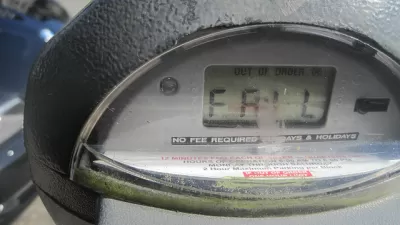Parking enforcers, not motorists in search of available parking, may be the main beneficiaries of 'smart parking' technology as they have the ability to immediately spot parking spaces where vehicles have overstayed their time limits and by how long.
Randall Stross, an author and professor of business at San Jose State University, analyzes the current state of smart parking technology and just how useful it is, and to whom.
"The (smart parking) term refers to a beguiling technology, now being tested in several cities, that uses sensors to determine whether a particular spot on the street or in a parking garage is occupied or vacant.
Smart-parking technology for on-street spaces is expensive, and still in its early stages. The largest examples are pilot projects with costs covered primarily by grants from the federal Department of Transportation. In San Francisco, the SFpark pilot project uses sensors from StreetSmart Technology for 7,000 of the city’s 28,000 meters. In Los Angeles, LA Express Park has installed sensors from Streetline for 6,000 parking spots on downtown streets.
Drivers are encouraged to use mobile apps to check parking availability and pricing, though coverage is not universal. Parker, for example, from Streetline, gives detailed information about on-street parking for Los Angeles, but not for San Francisco.
Smart-parking apps aren’t as useful as might be expected for drivers seeking open spots. When a parking space is vacated, there is a short delay before a sensor’s signal moves through the wireless network, reaches the centralized system and finally arrives on a driver’s phone. But if other cars are circling, even a 30-second or one-minute wait can be too long."
"As for parking enforcement, San Francisco and Los Angeles have begun to use the sensor technology to dispatch officers to cars that have stayed past their limits. That’s far more efficient that having officers roam streets in search of random meter violations. Zia Yusuf, the C.E.O. of Streetline, says that without smart parking, “no more than 8 to 10 percent of parking payment violations are ticketed.”
So one would think that more parking citations were being issued, but that's clearly not the case in San Francisco. It would appear that motorists are putting more money into the meters and pay stations (directly or through cell phones) and receiving far fewer citations.
Will Reisman, transportation reporter for the San Francisco Examiner, wrote on Dec. 16: "Instead of drawing in reams of revenue for the San Francisco Municipal Transportation Agency, the SFpark program has actually contributed to a slight loss. The agency expects to receive about $5.5 million less than expected from parking citations this fiscal year, although those losses are offset mostly by an increase of $4.4 million from additional meter revenue. The agency has a total budget of $830 million."
FULL STORY: The Learning Curve of Smart Parking

Planetizen Federal Action Tracker
A weekly monitor of how Trump’s orders and actions are impacting planners and planning in America.

Map: Where Senate Republicans Want to Sell Your Public Lands
For public land advocates, the Senate Republicans’ proposal to sell millions of acres of public land in the West is “the biggest fight of their careers.”

Restaurant Patios Were a Pandemic Win — Why Were They so Hard to Keep?
Social distancing requirements and changes in travel patterns prompted cities to pilot new uses for street and sidewalk space. Then it got complicated.

San Francisco Suspends Traffic Calming Amidst Record Deaths
Citing “a challenging fiscal landscape,” the city will cease the program on the heels of 42 traffic deaths, including 24 pedestrians.

California Homeless Arrests, Citations Spike After Ruling
An investigation reveals that anti-homeless actions increased up to 500% after Grants Pass v. Johnson — even in cities claiming no policy change.

Albuquerque Route 66 Motels Become Affordable Housing
A $4 million city fund is incentivizing developers to breathe new life into derelict midcentury motels.
Urban Design for Planners 1: Software Tools
This six-course series explores essential urban design concepts using open source software and equips planners with the tools they need to participate fully in the urban design process.
Planning for Universal Design
Learn the tools for implementing Universal Design in planning regulations.
Heyer Gruel & Associates PA
JM Goldson LLC
Custer County Colorado
City of Camden Redevelopment Agency
City of Astoria
Transportation Research & Education Center (TREC) at Portland State University
Camden Redevelopment Agency
City of Claremont
Municipality of Princeton (NJ)



























